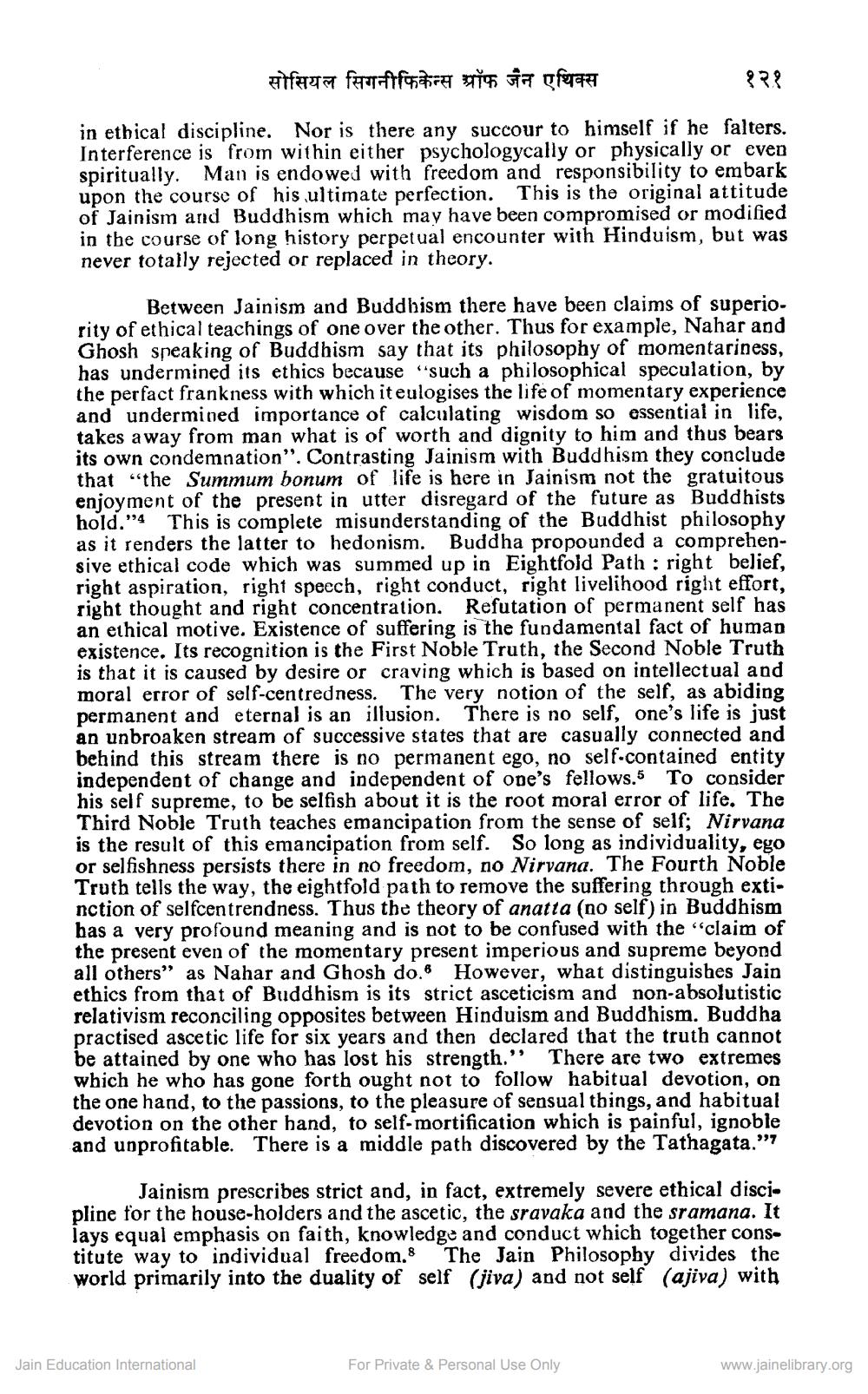________________
सोसियल सिगनीफिकेन्स ऑफ जैन एथिक्स
१२१
in ethical discipline. Nor is there any succour to himself if he falters. Interference is from within either psychologycally or physically or even spiritually. Man is endowed with freedom and responsibility to embark upon the course of his ultimate perfection. This is the original attitude of Jainism and Buddhism which may have been compromised or modified in the course of long history perpetual encounter with Hinduism, but was never totally rejected or replaced in theory.
Between Jainism and Buddhism there have been claims of superiority of ethical teachings of one over the other. Thus for example, Nahar and Ghosh speaking of Buddhism say that its philosophy of momentariness, has undermined its ethics because such a philosophical speculation, by the perfact frankness with which it eulogises the life of momentary experience and undermined importance of calculating wisdom so essential in life, takes away from man what is of worth and dignity to him and thus bears its own condemnation". Contrasting Jainism with Buddhism they conclude that “the Summum bonum of life is here in Jainism not the gratuitous enjoyment of the present in utter disregard of the future as Buddhists hold." This is complete misunderstanding of the Buddhist philosophy as it renders the latter to hedonism. Buddha propounded a comprehensive ethical code which was summed up in Eightfold Path : right belief, right aspiration, right speech, right conduct, right livelihood right effort, right thought and right concentration. Refutation of permanent self has an ethical motive. Existence of suffering is the fundamental fact of human existence. Its recognition is the First Noble Truth, the Second Noble Truth is that it is caused by desire or craving which is based on intellectual and moral error of self-centredness. The very notion of the self, as abiding permanent and eternal is an illusion. There is no self, one's life is just an unbroaken stream of successive states that are casually connected and behind this stream there is no permanent ego, no self-contained entity independent of change and independent of one's fellows. To consider his self supreme, to be selfish about it is the root moral error of life. The Third Noble Truth teaches emancipation from the sense of self; Nirvana is the result of this emancipation from self. So long as individuality, ego or selfishness persists there in no freedom, no Nirvana. The Fourth Noble Truth tells the way, the eightfold path to remove the suffering through extinction of selfcentrendness. Thus the theory of anatta (no self) in Buddhism has a very profound meaning and is not to be confused with the "claim of the present even of the momentary present imperious and supreme beyond all others” as Nahar and Ghosh do.6 However, what distinguishes Jain ethics from that of Buddhism is its strict asceticism and non-absolutistic relativism reconciling opposites between Hinduism and Buddhism. Buddha practised ascetic life for six years and then declared that the truth cannot be attained by one who has lost his strength." There are two extremes which he who has gone forth ought not to follow habitual devotion, on the one hand, to the passions, to the pleasure of sensual things, and habitual devotion on the other hand, to self-mortification which is painful, ignoble and unprofitable. There is a middle path discovered by the Tathagata."
Jainism prescribes strict and, in fact, extremely severe ethical discipline for the house-holders and the ascetic, the sravaka and the sramana. It lays equal emphasis on faith, knowledge and conduct which together constitute way to individual freedom. The Jain Philosophy divides the world primarily into the duality of self (jiva) and not self (ajiva) with
Jain Education International
For Private & Personal Use Only
www.jainelibrary.org




